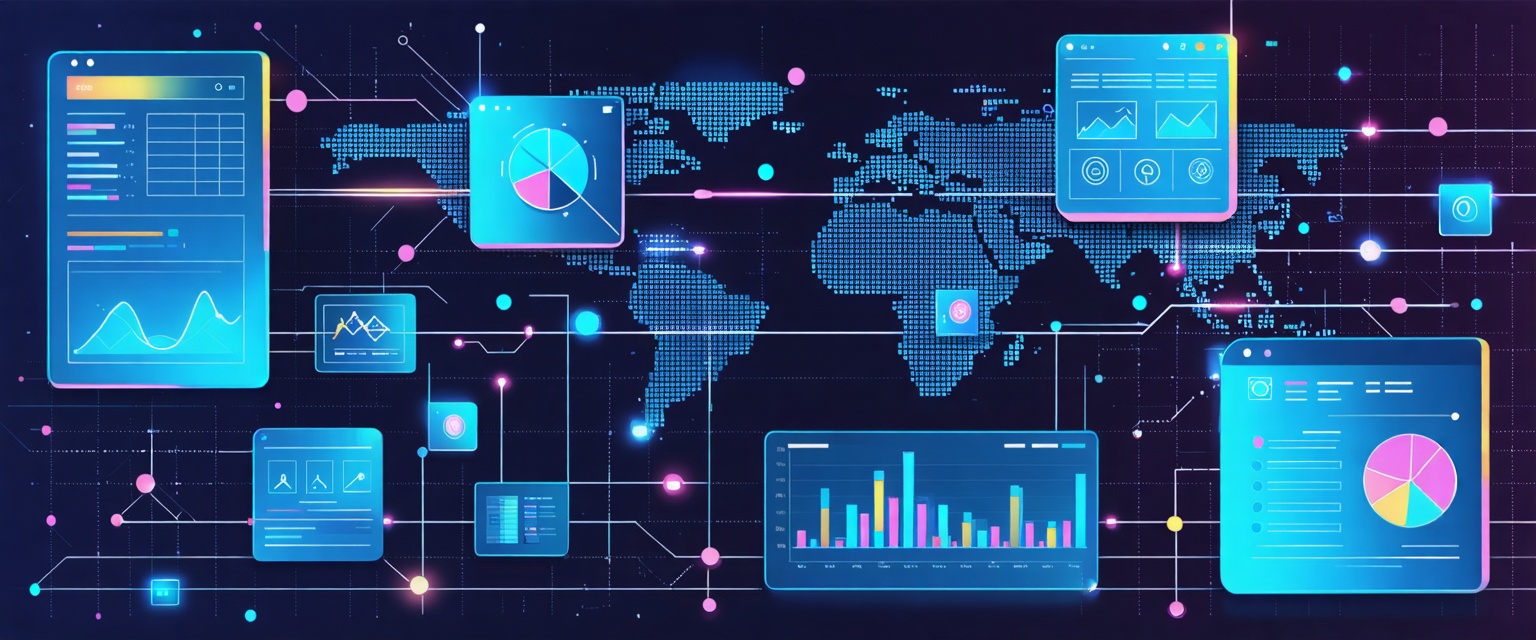Discover how AI agents automate account history summarization, overcoming data fragmentation and enhancing sales efficiency. Transform CRM chaos to clarity.
Summarizing Account Histories with AI Agents: What Account Managers Need to Know
Building a complete account history takes more effort than it should. Data lives across CRMs, inboxes, support tickets, and transaction logs, making it easy to miss critical context ahead of client calls or renewals. You spend hours piecing things together, only to end up with gaps that affect decisions and conversations.
Thanks to advancements in Agentic AI, it’s now becoming easier to automate this entire process. Datagrid’s data connectors link AI agents to your systems so they can extract, analyze, and summarize the data that matters.
This article breaks down how AI agents do the work from input to insight.
What Goes Into Account History Summarization
Account history summarization means gathering and condensing diverse client data into clear, actionable insights. This requires collecting transaction logs, interaction notes, and engagement records from multiple sources.
You'll need to extract data from CRM platforms, emails, transaction systems, and support databases. This might include six months of purchase activity, recent support interactions, or significant contract changes.
Good synthesis spots patterns, highlights key events, and puts information in context for smart decision-making. It transforms scattered information into a unified story that supports both daily interactions and long-term planning.
Account management requires knowing when to listen, when to lean in, and when to push. Clear account history becomes critical for nurturing these nuanced client relationships.
The payoff? Less prep time before meetings, complete clarity before client calls, and full context about each client's journey without spending hours reviewing scattered records.
Why Account Managers Rely on Accuracy in Account History Summaries
When preparing for a client call or renewal discussion, the accuracy of your account summary can determine success or failure. Precise summaries demonstrate understanding of your client's journey, while wrong information damages trust from the start.
Accurate Data for Client Engagement
Good data management gives you access to detailed records of customer interactions and histories. This context helps you quickly understand what account holders need and offer relevant solutions based on their past experiences.
When you can mention a recent support ticket resolution or acknowledge previous concerns about implementation timelines, you're showing genuine interest rather than making generic contact.
Imagine your summary says a client recently expanded their team, but you discover mid-conversation they actually downsized. What should have been a supportive check-in about resource optimization becomes an awkward pitch for additional services.
Avoiding Revenue Loss from Errors
Inaccurate summaries create blind spots that directly impact your revenue. When your account history misses declining usage patterns or payment issues, you're unprepared to address churn signals during critical renewal talks.
AI-driven summaries convert complex data into clear terms that help you grasp the true impact of client relationships.
Missing details about budget constraints or implementation challenges can lead you to propose completely off-target solutions. If your summary overlooks recent complaints about system complexity, you might suggest adding features when they actually need simpler workflows.
The Problem with Manual Account History Summarization
Creating comprehensive account summaries by hand quickly turns into a complex juggling act across disconnected systems. You find yourself pulling information from your CRM, digging through email chains, and accessing ERP systems for transaction data.
This fragmented data collection forces you into time-consuming verification. You're constantly cross-checking dates between systems, fixing format differences, and manually confirming information against multiple sources.
Picture copying transaction data into a spreadsheet, then spending hours comparing those entries with system records to ensure accuracy.
After gathering all the information, the real work begins: turning everything into a coherent summary. You read through raw transaction logs, interpret customer interaction patterns, and identify relevant details from months of support tickets.
Manual reporting remains incredibly labor-intensive, with teams dedicating substantial hours just to prepare reports. The drafting and formatting alone can consume time better spent on strategic client work.
The inconsistency across your team creates additional problems. Different account managers create different summary formats for similar accounts, causing confusion when colleagues need to step in or when leadership reviews multiple accounts.
Team members often pull the same data manually, creating conflicting insights and requiring costly rework.
How AI Agents Transform Account History Summarization
AI agents streamline account history summarization by automatically pulling data from CRMs, emails, and transaction logs, identifying key client activities, and generating concise summaries. This reduces manual effort, minimizes missed context, and helps account managers act quickly with accurate, up-to-date insights.
Autonomous Data Aggregation Across Multiple Sources
AI agents connect directly to your existing systems through APIs, eliminating manual data collection. These agents integrate with CRM platforms, transaction systems, support logs, and even perform tasks such as scanned document extraction with AI, continuously syncing and retrieving new data automatically.
An AI agent can fetch the last 30 days of emails, transaction records, and support tickets, consolidating this information into a unified dataset ready for analysis. This approach ensures your account histories stay current without requiring constant manual updates.
Natural Language Processing for Concise Summaries
AI agents parse extensive communication records and extract meaningful insights with precision. Natural language processing can transform a 10-page email thread into two concise sentences capturing the essential points, saving hours of reading time.
These specialized summarization modules understand context, identify key decisions, and highlight action items needing follow-up, even enabling businesses to automate newsletters with AI to keep stakeholders informed without manual effort. This targeted approach delivers relevant, actionable summaries rather than generic data dumps.
Pattern Recognition and Contextual Analysis
AI agents spot subtle trends and anomalies that humans miss during manual review. They detect declining purchase frequency, sentiment shifts in support communications, or engagement drops that signal potential churn risks.
These pattern recognition capabilities enable proactive account management by flagging accounts needing immediate attention or presenting upsell opportunities based on historical behavior.
The AI continuously analyzes communication tone, transaction timing, and interaction frequency to provide insights about account health, and helps automate analytics reporting with AI.
Integration and Visualization of Summarized Data
Modern AI agents integrate summarized information directly into your existing workflows and dashboards, seamlessly connecting systems like HubSpot & LinkedIn or Salesforce with PandaDoc.
The system automatically populates account overview panels in your CRM before important client calls, complete with trend charts and key metrics. This integration ensures that insights appear where you need them most, whether in pre-meeting briefings, quarterly reviews, or to automate content briefs, making the information immediately actionable.
Continuous Learning and Adaptation to Industry Contexts
AI agents improve over time by learning from your feedback and adapting to your specific industry terminology and client preferences. When you edit an AI-generated summary, the system incorporates this feedback to enhance future outputs.
This continuous learning means the agents become increasingly accurate at identifying what matters most for your particular business context, whether that's compliance requirements in financial services, where you can automate finance compliance, or project milestones in consulting relationships.
The result is increasingly precise summaries that fit your organization's unique needs and communication style.
Datagrid for Sales Professionals
Sales teams struggle with managing prospect data, deal documentation, and competitive intelligence across disparate systems. This constant juggling creates inefficiencies that lengthen sales cycles and reduce closing rates. Datagrid's AI-powered platform streamlines these processes to accelerate your path to closed deals.
Lead Intelligence Enhancement
The platform processes thousands of prospect interactions, company data points, and market signals simultaneously to identify high-potential opportunities, performing tasks like prospect database cleanup automation, AI-powered lead enrichment, and helping you to maximize leads with AI.
It automatically organizes prospect information into actionable intelligence, revealing your most promising leads and optimal engagement timing.
This systematic approach eliminates manual data sorting, allowing your team to focus on the leads most likely to convert.
Sales Document Automation
Datagrid extracts critical information from RFPs, proposals, and contracts to generate customized sales materials addressing specific client needs. The system transforms unstructured data into structured intelligence, enabling quick adaptation of existing proposals to match new prospect requirements, essentially helping you to automate sales proposals.
Your team can cut document preparation time significantly while creating more targeted materials.
Competitive Win/Loss Analysis
AI agents analyze won and lost deals across your CRM, identifying patterns in decision criteria, objection types, and competitive positioning. This systematic processing reveals which factors consistently lead to successful closes and which warning signs predict deal failure.
These insights allow sales teams to replicate successful strategies and avoid common pitfalls that derail deals.
Client Communication Intelligence
The platform automatically analyzes email exchanges, meeting notes, and call transcripts to identify buying signals, stakeholder sentiments, and potential roadblocks.
Pattern recognition capabilities help you understand not just what prospects are saying, but what their communication reveals about purchase intent, enhancing your sales engagement strategy with AI.
Sales representatives gain insight into decision-making progress without spending hours reviewing communications, benefiting from email outreach optimization powered by AI.
The platform's AI capabilities revolutionize client interactions, as seen in industries like construction, where AI revolutionizes client interactions.
Pipeline Health Monitoring
Datagrid processes historical deal information to predict close probabilities accurately, identify stalled opportunities, and recommend specific actions. AI agents continuously analyze pipeline metrics, deal progression patterns, and historical conversion rates to provide early warnings about at-risk deals.
The system suggests targeted interventions to keep opportunities moving forward, preventing deals from stagnating.
Account Expansion Opportunities
The platform analyzes existing customer documentation, usage patterns, and industry benchmarks to identify upsell and cross-sell opportunities. By examining account histories and comparing them to similar successful expansions, Datagrid highlights which clients are most likely to benefit from additional products or services.
This approach turns your existing customer base into a source of predictable revenue growth.
Territory and Market Planning
Datagrid processes regional sales information, account potential, and competitive presence to optimize sales coverage and resource allocation. The platform's integration with over 100 software platforms ensures comprehensive data collection from all relevant sources.
This enables sophisticated territory analysis considering market conditions, account distribution, and competitive dynamics to maximize sales effectiveness.
Sales representatives can focus on relationship building and deal closing while AI handles data-intensive analysis that typically consumes valuable selling time. Your team spends more time engaging prospects and less time gathering information, accelerating your entire sales process.
Simplify Sales Tasks with Datagrid's Agentic AI
Don't let data complexity slow down your team. Datagrid's AI-powered platform is designed specifically for teams who want to:
- Automate tedious data tasks
- Reduce manual processing time
- Gain actionable insights instantly
- Improve team productivity
See how Datagrid can help you increase process efficiency.













